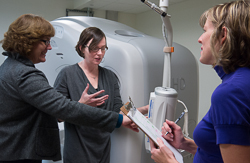
The CT research program at UW-Madison is actively engaged in projects on advanced CT data acquisition methods, advanced CT image reconstruction and post-processing methods, and translational research to bring cutting-edge CT technologies into clinical practice. Under the direction of Drs. Meghan G Lubner, MD, FSAR, FACR and Guang-Hong Chen, PhD, the CT program features extensive collaboration among medical physicists, radiologists, and industrial engineers from the UW Departments of Medical Physics and Radiology, and GE Healthcare. The CT research program is well equipped with state-of-the-art GE CT 750 HD scanners with advanced tools including gemstone/dual energy and high-resolution imaging, preclinical CT scanners, and other advanced experimental equipment to enable research at both basic science and clinical levels. The group has published extensively in almost all areas of CT research with more than 100 scientific publications and attracted more than $10 million in research funding from both NIH and industry. Recently, the group has done pioneering work in dose reduction by creating a novel iterative reconstruction algorithm termed Prior Image Constrained Compressed Sensing (PICCS). This technique is currently being prospectively evaluated and the dose reduction project recently received a $1.8 million grant from the NIH. Other clinical research interests include novel applications of dual energy CT, CT perfusion, and advanced 3D post-processing techniques. Clinical services include a wide range of imaging protocols including non-contrast applications such as renal stone studies or CT colonography as well as routine and advanced multiphasic post-contrast imaging including CT angiographic/high-resolution techniques such as the abdominal wall flap protocol used in patients prior to breast reconstruction.